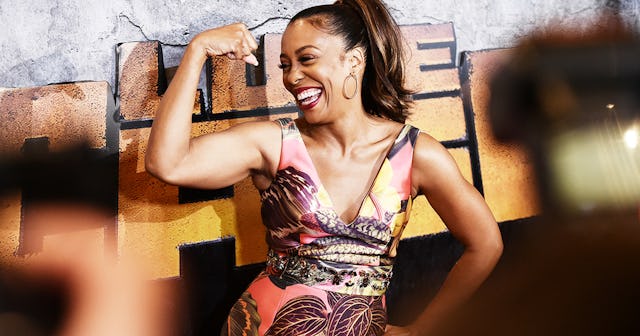Karen Pittman Is 'And Just Like That's' Most Unapologetically Real Character

Karen Pittman has no time for the relentless and relentlessly exhausting rose-colored fetishization of motherhood. Or the belief that having working ovaries means you’re meant to reproduce, or else you’re half a person. “It’s really hard to have that conversation, amongst women where we actually say, ‘Hey, guess what? Motherhood is actually a little overrated,’” she told Scary Mommy.
The stars have somehow aligned in Hollywood that the verboten issue of reluctant motherhood is finally, finally, being explored in a thoughtful, smart way. Maggie Gyllenhaal’s The Lost Daughter is a nail-biter of a drama featuring a mother who’s just not that into it, who calls the responsibility “crushing” and makes choices that both fulfill and haunt her. And in the more lighthearted setting of the the Sex and the City revival And Just Like That…, Pittman’s Dr. Nya Wallace is an accomplished college professor who has a hot husband, a steamy marriage, and an unyielding pit in her stomach at the thought of having a baby, complicated by an so far unsuccessful IVF journey. Her most unfiltered sounding board is Miranda Hobbes (Cynthia Nixon), a student-turned-friend, who tells her that it’s in fact possible to regret becoming a parent.
“I thought it was timely. I thought it was important. My character is beyond the age where you would really think, ‘Oh, I’m going to have two or three or four or five children.’ She’s like, ‘I just want to get one out real quick and then move on with my life,’” says Pittman, who herself has two kids, whom she’s hesitant to discuss in interviews.
Pittman’s Nya is vibrant and confident. Joyous and passionate. Sexual and sexy. And she’s also a realist who understands that if or when she gets pregnant, she’s “going to be mostly responsible for (child-raising). And I don’t know if I want to change my life.”
Born in Mississippi and raised in Nashville, Pittman earned a BA in voice and opera at Northwestern University and a Masters of Fine Arts from NYU’s Graduate Acting Program. A while back, she posted the following on Instagram: “I have spent a large portion of my career being the only Black woman in a sea – rather- an ocean of White actors…It is not easy, some days, exhausting. But I have been very lucky. In my body of work, I have found collaborators who are interested in an inclusive and nuanced conversation of how humans behave, and then we discern if my talent and the gift of my Blackness can inform and tell a more daring and unpredictable story.”
She went on that she feels “emboldened to step out whenever I can.” She refuses to settle, to be arm candy, or the quirky, pithy neighbor. And thanks to her tenacity, coupled with a nose for rich material, she’s having something of a moment.
“I don’t know what this moment is or what it’s going to amount to, but I was talking to someone about this on Sunday. There is something about the ability to represent women, specifically, but also women of color, as we are represented on a lot of American television or in cinema, where we’re very strong and we’re capable and we’re ambitious and we’re badass. But we’re also as fragile and as vulnerable as the white women who I stand next to,” she says.
“Underneath the skin color is the woman who is dealing with the same challenges and issues of being empowered and trying to figure out what the heck that means. I am representative of a generation of women who are coming from that perspective of female equality in a workplace and parity and equity, and how empowered we’re supposed to feel over it and what autonomy, and ambition, and self-realization looks like for our generation of women, but especially women of color.”
Pittman is fascinated by the dichotomy of a woman who’s as unapologetically ambitious as any of her male counterparts, but is in equal parts vulnerable, soft, and emotional. She’s embraced precisely that on The Morning Show, playing a dogged, if often demoralized, producer slogging along in a toxic workplace but always, always, holding her head high and refusing to apologize for the choices she makes. And instead of being the token Black best friend on And Just Like That…, she’s a full-fledged, well-rounded character who articulates what so many women of a certain age feel: Is upending a fulfilling career worth it, to have a baby you’re not even all that sure you want?
“I was talking to my tribe of women, who are mostly women of color. We’re of that generation of women who were post-Anita Hill. We are born from those women who decided to actually go out and gather their education and go out into the workplace,” says Pittman. “And that’s a different conversation for women of color, because we haven’t been able to do that for that long. Now as women, we can go out into the workplace and we can make a good salary. My mother could not get her own bank account without either her father or her husband signing off.”
She’s equally forthright about the thorny, complex issue of women trying to have it all. Maybe, possibly, some moms figure out a way to get everything while sacrificing nothing. Pittman muses that it just might not be possible.
“I think that’s a great conversation to be having, especially for women in my generation, women of color. There’s this sense, if you have a great Black man, and you’re in a great marriage, and you’ve got a great career, of course, you’re going to have children. Of course, you are,” she says.
Or maybe, if you’re Nya, you won’t.